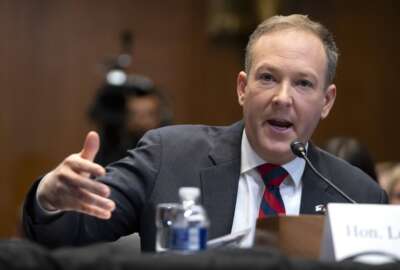Senators delay federal telework bill to consider adding work-from-home supervision
The Telework Reform Act will move to the full Senate for consideration, while the Telework Transparency Act will remain in the committee for further discussion.
A few senators on the Homeland Security and Governmental Affairs Committee are digging in their heels on a federal telework bill, calling for more “accountability” of teleworking employees governmentwide.
On a list of bills HSGAC considered for advancement Wednesday morning, the Telework Transparency Act aims to paint a clearer picture of telework across agencies. But during the committee’s consideration of the legislation, more questions than answers came up among members.
There appeared to be at least some agreement among committee members on the intent of the legislation, but pushback from several Republican members propelled HSGAC Chairman Gary Peters (D-Mich.) to hold over the bill and postpone its advancement.
The bipartisan bill, which Peters and Sen. Joni Ernst (R-Iowa) introduced in April, would require agencies to offer more up-to-date information on federal telework, something that’s been a sticking point in Congress for months. Agencies would have to make their telework data public, more consistently measure their use of office space, go through periodic audits, and monitor the effects of telework on productivity, recruitment, retention, customer service, property management, and more.
But in a proposed amendment to the bill, Sen. Mitt Romney (R-Utah) said there should be even more requirements for agencies to supervise and monitor federal employees who work from home.
“It’s not saying what the monitoring has to be — it could be a call, it could be just an email at the end of the day,” Romney said. “But the idea of people teleworking and having no report whatsoever, no monitoring whatsoever, doesn’t make a lot of sense.”
Last week, Romney introduced his own bill related to federal telework, alongside Sen. Joe Manchin (D-W.Va.). The Back to Work Act would require telework-eligible federal employees, with some limited possible exceptions, to spend 60% of their work hours in the office. It would be an increase from the current 50% in-the-office goal the Biden administration has already set for agencies.
Peters said he agrees with the general concept of Romney’s proposed amendment but added that he wants to collaborate on the exact language ensure it makes sense.
“We also need to balance this oversight with guardrails around what type of monitoring agencies would conduct,” Peters said. “I think without proper guardrails, it could result in employers misusing this authority and infringing on privacy and civil rights.”
More broadly, HSGAC Ranking Member Rand Paul (R-Ky.) and Sen. Roger Marshall (R-Kansas) both expressed concerns and high discontentment with teleworking federal employees, and pushed for even further oversight.
“To encourage telework as some of these bills are doing without significant controls … would be a big mistake,” Paul said.
“I want to make it clear, I’m against teleworking from home — I’m just against it overall at the government level,” Marshall added. “There’s no accountability out there. What we’re doing today … doesn’t go far enough.”
Still, many federal employees are wary of the scales tipping too far in the other direction — and federal unions have said it’ll have to be about striking the right balance between supervision and surveillance. There’s little evidence of federal managers taking up the more intrusive employee monitoring practices that much of the private sector is embracing, but unions are guarding against that potential as the technology evolves. Another recent bill, the Stop Spying Bosses Act, would create new rules around the use of worker surveillance technologies, and create a new division at the Labor Department to regulate workplace surveillance.
During Wednesday’s HSGAC mark-up, Sen. Margaret Hassan (D-N.H.) said government employees should be commended for their hard work, rather than broadly painted in a harsh negative light.
“As somebody who has teleworked herself and was judged by the quality of my work and the outcomes that I produced, I find it hard to believe that we have to unnecessarily micromanage the accountability here,” Hassan said. “Federal supervisors have obligations to make sure that their employees are doing their work, and they should. But let’s just refrain a little bit from painting all public employees with the same broad brush. Many of our federal employees went well above and beyond during COVID to serve the public. And I think it’s important to recognize that.”
A separate federal telework bill the committee considered on Wednesday garnered no discussion among HSGAC members. The Telework Reform Act advanced out the committee in a vote of 9-2. Paul and Romney were the two committee members who voted against the bill.
That legislation, which Sens. James Lankford (R-Okla.) and Kyrsten Sinema (I-Ariz.) introduced in October 2023, aims to promote management, accountability and transparency in federal telework. If enacted, it would codify the definitions of telework and remote work in government, and require teleworking federal employees to report to the office at least twice per two-week pay period.
Part of the bill also focused on supporting recruitment and retention of the spouses of military members, veterans and federal law enforcement officers. If enacted, the Telework Reform Act would let agencies appoint spouses to remote-eligible federal jobs outside the competitive hiring process.
“This gives them the opportunity to be able to get those remote jobs [at] different agencies,” Lankford said. “While their spouse is on a federal law enforcement … remote assignment, or in the armed services on a remote assignment, that spouse could maintain a career — not just find a random job in each location, but actually build a career as well. We think that’s incredibly important to be able to allow that.”
Copyright © 2025 Federal News Network. All rights reserved. This website is not intended for users located within the European Economic Area.
Drew Friedman is a workforce, pay and benefits reporter for Federal News Network.
Follow @dfriedmanWFED






